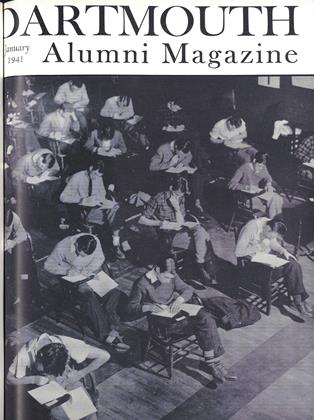AMONG THE SEVERAL authorities on the program of the five-day conference on "The Defense of the Americas" held in Hanover recently was Carl B. Spaeth '29. He is executive assistant to Nelson Rockef eller '30, coordinator of commercial and cultural relations between the American Republics. Mr. Spaeth, an old Rhodes Scholar, revealed during his visit to Hano ver that Latin America is the sole and absorbing subject of conversation of Mr. Rockefeller's group of workers who all live in one house and who all work together in the State Department offices in Washington.
In this issue we are glad to publish a description of Nelson Rockefeller's new job. He has tackled it with the energy, ability, and determination that have distinguished his career in the past decade. and before that, in the years of college. For Dartmouth men, and especially for the authorities in Hanover, his statement in the interview that he is "going to look to Dartmouth for support" in the field of cultural relationships between the Americas is an especially pertinent point in his program. The College has for a second year held a Conference on Inter-American Relations. An excellent beginning has been made in plans for strengthening the place of "all the Americas" on the campus. Much more needs to be done.
Messrs. Rockefeller, Spaeth, John Clark '32 and other alumni are leaders in a vigorous, strongly backed movement to bring tangibles out of the talk and common agreement that "something ought to be done" about South America. Meanwhile restless undergraduates complain that they feel "out of everything"—far removed from the excitement they sense in the fast-moving currents of world affairs. Could any better opportunity be offered an institut ion for a stimulating and helpful relation of its academic work with significant and challenging public affairs than in an expansion of understanding and knowledge of the American Republics? What Dartmouth has already done in this matter of the greatest importance in educational policy points the way, we are confident, to a greater emphasis and activity in the future.
A YOUNG MAN in the freshman class will . never starve to death. In fact he should be dangling a Phi Beta Kappa key before long. He proved his acumen when confronted by sophomores this fall at the front of his dormitory directing a group of freshmen moving furniture; at the back entrance a rug-beating bee was in progress, presided over by other sophomores. Just at that moment our hero should have been on his way to a tennis date. He wrapped his tennis racquet in a small rug, picked up a chair and left the dorm under approving glances of the sophomores. "Here I am" he announced to his friends at the tennis courts, unwrapping his racquet from the rug.
 View Full Issue
View Full Issue
More From This Issue
-
 Article
ArticleHarry Hillman, Sportsman
January 1941 By FRANCIS E. MERRILL '26 -
 Article
ArticleThat Men May Understand
January 1941 By HAROLD ORDWAY RUGG '08 -
 Class Notes
Class Notes1918*
January 1941 By ERNEST H. EARLEY, DONALD L. BARR -
 Article
ArticleALUMNI TRY THEIR WINGS
January 1941 By Everett Wood '38 -
 Article
ArticleThe Undergraduate Chair
January 1941 By Charles Bolté '41 -
 Class Notes
Class Notes1921*
January 1941 By CHARLES A. STICKNEY JR, ROGER C. WILDE
The Editor.
-
 Article
ArticleGRADUS AD PARNASSUM
November 1939 By The Editor. -
 Article
ArticleNot Too Late
December 1940 By The Editor. -
 Article
ArticleFamous Family
December 1940 By The Editor. -
 Article
ArticleCensors of the Schools
January 1941 By The Editor. -
 Article
ArticleHarry Hillman
January 1941 By The Editor. -
 Article
ArticleGRADUS AD PARNASSUM
February 1941 By THE EDITOR.
Article
-
 Article
ArticleLOCAL FRATERNITY GOES NATIONAL
February 1919 -
 Article
Article1925 Bequest Program
July 1950 -
 Article
ArticleBetter and Better
December 1955 -
 Article
ArticleRoland Hayes
May 1929 By Albert I. Dickerson -
 Article
ArticleDartmouth 20, Brown 0
November 1960 By DAVE ORR '57 -
 Article
ArticleEdward N. Lorenz '38: Maestro of Meteorological Research
MARCH • 1985 By Dirk Olin '81

